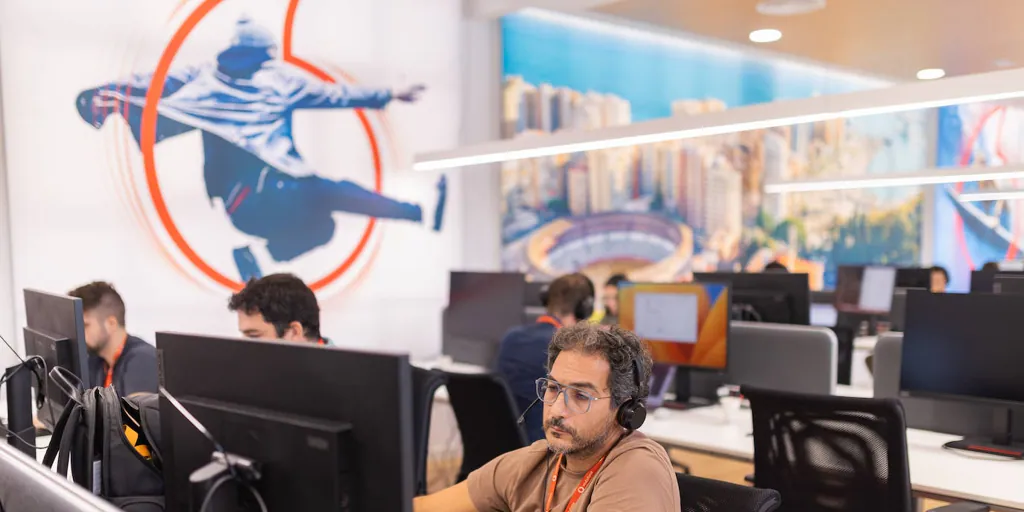In just three months, Vodafone managed to transform its facility in the heart of Malaga into one of Europe’s technological innovation hubs. In the R&D center located in the Martiricos neighborhood a mix of creative minds from 33 countries living side by side different ones that aim to shape the future of connectivity.
“We have people from Argentina and Chile to New Zealand, India, Turkey and the United States,” said its director, Jesús Amores, who opened the doors of his facility to the ABC to learn about daily life these days. but a promising project where More than 450 people are already working.
The cultural and social diversity is evident once you pass through the security barrier, as English begins to be heard among the employees’ conversations as they drink coffee on the central terrace. It’s a large shared space in a building where hierarchies are blurred. “There are no labels or seats reserved for anyone. Here people mingle and interact to bring out the best in each other,” said Amores.
Diversity, not just demographics, has been at the heart of the center where we are diverse cultures, perspectives and experiences encourage creativity and collaboration. In this breeding ground, stories like Franck Guenerie’s are depicted. The Nice-born Frenchman started out working in Paris and Madrid at construction materials and air logistics companies before landing at Vodafone’s Innovation Center, where he has now established himself as a transformation specialist.
His work focuses on streamlining internal processes to bring enterprise solutions to multiple markets in the fastest and most efficient manner. «Agility is key because we have to adapt to the demands of the company», says Guenerie, who in just a year and a half has been involved in several projects, proving that «flexibility» is a fundamental pillar of his work.
Its history is a living testimony to the capacity for adaptation and evolution required by a sector, namely the technology sector constant change.
This also increases local talent
Franck is one of the international faces in a project that is also fostered by local talents such as Leticia García, who returned to Malaga after working on human rights projects in Africa and Latin America. For him, the ‘hub’ has given him the “perfect balance” of being close to his family and at the same time not giving up on his professional challenges, which now focus on managing a team of software developers in-house. a platform to improve and make transportation safer in Europe.
Vodafone Innovation Center Member
MARTIN MESA
Although now at home, García is one of hundreds of Spanish graduates who have had to look abroad because of poor job prospects. which is largely starting to turn around thanks to Malaga’s tech ecosystemit was boiling and its reverberations reverberated throughout the world.
The potential of the Costa del Sol capital is what encouraged Alberto Reyes to stay in his country. «I applied to start the recruitment process and I was lucky»explained the young man from Ronda who studied software engineering and has been working on the MiVodafone mobile application project for 14 months.
“I work with colleagues spread throughout Spain, but also in Egypt or England,” says Alberto, who assures that after four years of experience“Every day you learn something new” due to the changing nature of the digital world. The experience is a reflection of the restless spirit and curiosity that drives the innovators of this “unique” space, according to the director.
Connection via satellite
In this “UN” innovation, due to the origin of its members, projects related to Open RAN stand out, an initiative that redefines the possibilities of connectivity. According to Italy’s Vaifro Dariol, a chip development expert, they are currently collaborating with giants like Intel to improve connections via satellite. Something fundamental for areas not covered by traditional coverage and it can be crucial in challenges such as fire control and prevention or the search for missing people.
Apart from that, there are also Mobile Private Networks solutions, which enable the creation of independent and secure communications networks for critical applications, such as autonomous vehicles and robots. “This technology allows bulls in the factory to be quicker and safer; that in a port cranes can be controlled independently or “That from Malaga we can manage excavators working in a mine in Australia”explains Jesús Amores, who highlights the success of projects such as DJP 3.0, which provides dynamic information to drivers, pedestrians or cyclists to avoid traffic accidents.

“Entrepreneur. Internet fanatic. Certified zombie scholar. Friendly troublemaker. Bacon expert.”







